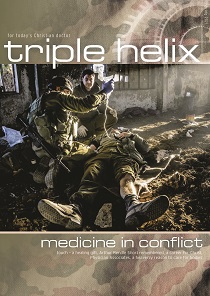'Why be a doctor? Why should I bother to heal and cure bodies if everyone is going to die in the end? Why don't I become an evangelist?'
I was leading a discussion group for medics when one of them asked this question. At first hearing, her line of reasoning seemed logical. If the most important concern of our lives on earth is the eternal destination of our souls, then why do health professionals spend their time healing bodies that will only get ill again and eventually die? Why spend countless years studying and practising our professions if our bodies are destined to become nothing but dust? Surely, if we take our faith seriously, then we should all be evangelists and spend our energies saving souls for heaven. Would this student be right to give up medicine and become an evangelist? Well, it depends on your view of 'heaven'.
A common way we think of heaven is as a place where God and Jesus live and where the non-material part of us, our soul or spirit, goes when we die. Many Christians believe that at the end of time, when Jesus returns, he will destroy this sin-infected material creation and take the souls of the righteous to be with him in heaven. In this understanding of the afterlife, the mission of the Christian on earth is to save as many souls as possible for a future of heavenly bliss. The main question that the gospel answers is, 'how do I get to heaven when I die?' But if we look at the Bible, we see that the idea of heaven as an escape route is a reduction of the gospel that owes more to a dualistic worldview than it does to the Christian Scriptures.
It is a common feature of many religions to propose a dualism between heaven and earth as part of a larger opposition between a perfect, higher spiritual realm and a fallen, lower material world. In this worldview, if we want to pursue the spiritual quest, we must ignore the pleasures and pains of our bodily existence and focus on the inner spiritual ascent of the soul. The apostles had to counter such dualistic teachings spread by Gnostic religious sects that were infiltrating the first Christian congregations. [1] But it was in the third and fourth centuries after the death of Jesus that dualistic beliefs began to have a more pervasive influence on some parts of the early church. These came through a group of Greek philosophers known as the Neoplatonists who taught that humans were comprised of a pure immortal soul trapped within a sinful material body. [2]
As Neoplatonic philosophers began to engage with Christian theologians, this dualism between spirit and matter began to permeate parts of the early church so that heaven and earth, spirit and matter, soul and body became in opposition to one another. This dualistic thinking has affected the church in various ways ever since. One example is the enduring negative attitude to bodily sexuality that some churches have. But in the Bible, there is no such dualism between spirit and matter.
The Christian story begins in Genesis with the goodness of the created physical world [3] and ends in Revelation with the redemption of the created physical world. [4] God didn't create humans as souls trapped in bodies but as integrated physical-spiritual beings. [5] He gave us bodies because he wanted us to be a part of his physical creation. Our bodies are not barriers to spirituality, as the Neoplatonists taught, but an essential part of our spirituality since they are integral to us fulfilling the mission God gave us on earth. [6] The brokenness we experience in the world is not because the material creation is inherently evil but because human hearts have turned away from God. Yet God has not given up on his world or on humanity.
God's work of grace in human history is not to destroy the earth but to bring heaven and earth together in one glorious, renewed reality. [7] Until that day, the whole creation is groaning as it waits to be 'liberated from its bondage to decay'. (Romans 8:21-22) We too groan with creation as we suffer sickness, disease and death that marks this fallen world. But God's answer is not an escape into an otherworldly heaven but to work towards the restoration of the creation by bringing the kingdom of heaven to earth. This work of re-creation includes our physical bodies, something that is clearly demonstrated by the healing miracles that Jesus performed in his earthly ministry.
When Jesus began to preach, his message wasn't, 'escape with me into a spiritual heaven' but, 'Repent, for the kingdom of heaven is near'. (Matthew 4:17) His message was about the kingdom of heaven coming to be near us, here on earth. And the first signs of this kingdom were healing miracles. Social outcasts with leprosy were restored to health, [8] a man so violent that he had to be constrained by chains was returned to his right mind, [9] a dead girl was brought back to life, [10] and a man born blind could see for the first time. [11] These were miracles that required complete re-creation of a broken and fallen world. Only the re-creative power of heaven could re-wire a visual cortex that had never received neural input so that it could see again. However, it took Jesus' resurrection to really convince the disciples that Jesus had come to bring the restoring power of heaven to this material world.
When the disciples first encountered the risen Christ, they assumed he was a ghost, a disembodied spirit. [12] But Jesus encouraged them to touch him and even ate some fried fish to prove that he still had a body. [13] When he ascended into heaven, he did not leave his body behind on the hillside but took it with him. [14] And when Jesus comes to earth again, it will not be to take our souls to heaven but to reunite the souls of the dead with their re-created bodies. [15] This is why the earliest Christian confessions of faith affirmed their belief in 'the resurrection of the body'. [16]
So, when as health professionals we care for bodies, we are not wasting our time. Rather, we are participating in the work of restoring God's creation. It is not the case that to be a doctor or a nurse is a secular occupation and the 'really spiritual calling' is to be an evangelist. Of course, telling people the gospel is vitally important because they need to know about the forgiveness and new life that God offers through Jesus Christ. But to care for bodies is to participate in the hope of recreation just as much as evangelising. When we care for bodies, we proclaim the uniquely Christian hope that God is bringing his kingdom of heaven to heal and restore the earth. The gospel is a lot bigger than just saving souls for heaven because God's will is to 'bring everything in heaven and on earth under Christ' (Ephesians 1:10). God's work in and through Jesus and his church is to save not just individual souls but to save whole human beings - including their bodies - entire cultures, and all earthly history, for the glorious joy of his new creation.
Dr James Paul, director of the English branch of L'Abri Fellowship and a former palliative care doctor in London.
This article is based on James' brand-new book, What on earth is heaven? (IVP Books), in which he explores what the Bible has to say about questions such as 'what is heaven?', 'where is heaven?', 'why can't science find heaven?', 'what happens to us after we die?', and 'what does heaven have to do with our lives now on earth?'
































